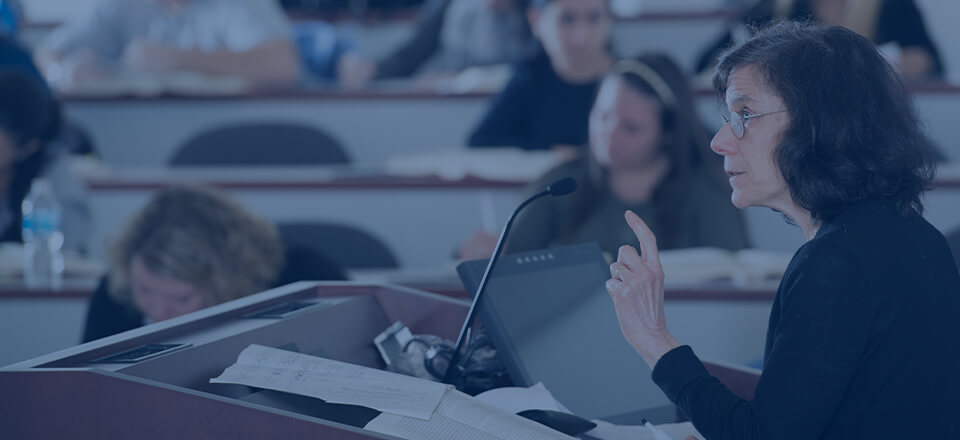Touro Law Co-Sponsors Conference on Law as Business or Profession
About
Touro Law Co-Sponsors Conference on Law as Business or Profession
Conference to be Held on April 23, 24 at Fordham Law School
April 19, 2012Julius Henry Cohen was an influential lawyer who played a substantial role in numerous matters of public interest in the first half of the twentieth century. For example, Cohen assisted in the formation of the Port of New York Authority and served as its general counsel for more than twenty years; he served as a founding member of the American Arbitration Association; along with Louis Brandeis, he helped resolve the 1910 garment workers' strike in New York; and, in opposition to Louis Marshall and much of the legal establishment, he defended the 1920 Emergency Rent Laws through the New York Court system up to the United States Supreme Court.
Yet, for scholars of legal ethics and the legal profession, Cohen's most significant legacy may be his landmark book, The Law: Business or Profession, published in 1916. Cohen's book represents the first full-length consideration of the business/profession dichotomy, an issue that attracted considerable attention around the turn of the century and has remained a perennial concern for legal scholars and practitioners alike.
"Touro Law Center is excited to sponsor this conference with Fordham Law School,” said Samuel J. Levine, Professor of Law and Director of the Jewish Law Institute at Touro Law Center and conference co-organizer. “Both Touro and Fordham place a strong emphasis on the ethical development of law students, and the conference will bring together leading ethics scholars from across the county, reflecting upon one of the earliest books addressing the ethical challenges lawyers confront in their work."
In exploring the question posed succinctly in his title, Cohen closely examines a number of areas of legal practice that, nearly one hundred years later, remain central in the work of both ethics scholars and bar associations. Among other issues, Cohen addresses: standards of legal education, including evening law school programs; standards of admission to the bar, including discrimination on the basis of race or ethnicity; prohibitions on unauthorized practice of law; lay participation in legal practice; the structure and atmosphere of large corporate law firms; commercialization of legal practice; advertising for lawyers; and the role of the lawyer in society.
Building on these themes, the conference will bring together scholars in the areas of legal ethics and legal profession, along with leaders of the practicing bar, in a wide-ranging discussion of the continuing relevance of Cohen's thought for the practice of law in the twenty-first century.
Papers from the conference will be published in the Fordham Urban Law Journal. For more information, please visit http://calendars.fordham.edu/EventList.aspx?fromdate=4/24/2012&todate=4/24/2012&display=Day&type=public&eventidn=897&view=EventDetails&information_id=2803.
Yet, for scholars of legal ethics and the legal profession, Cohen's most significant legacy may be his landmark book, The Law: Business or Profession, published in 1916. Cohen's book represents the first full-length consideration of the business/profession dichotomy, an issue that attracted considerable attention around the turn of the century and has remained a perennial concern for legal scholars and practitioners alike.
"Touro Law Center is excited to sponsor this conference with Fordham Law School,” said Samuel J. Levine, Professor of Law and Director of the Jewish Law Institute at Touro Law Center and conference co-organizer. “Both Touro and Fordham place a strong emphasis on the ethical development of law students, and the conference will bring together leading ethics scholars from across the county, reflecting upon one of the earliest books addressing the ethical challenges lawyers confront in their work."
In exploring the question posed succinctly in his title, Cohen closely examines a number of areas of legal practice that, nearly one hundred years later, remain central in the work of both ethics scholars and bar associations. Among other issues, Cohen addresses: standards of legal education, including evening law school programs; standards of admission to the bar, including discrimination on the basis of race or ethnicity; prohibitions on unauthorized practice of law; lay participation in legal practice; the structure and atmosphere of large corporate law firms; commercialization of legal practice; advertising for lawyers; and the role of the lawyer in society.
Building on these themes, the conference will bring together scholars in the areas of legal ethics and legal profession, along with leaders of the practicing bar, in a wide-ranging discussion of the continuing relevance of Cohen's thought for the practice of law in the twenty-first century.
Papers from the conference will be published in the Fordham Urban Law Journal. For more information, please visit http://calendars.fordham.edu/EventList.aspx?fromdate=4/24/2012&todate=4/24/2012&display=Day&type=public&eventidn=897&view=EventDetails&information_id=2803.
XXX
Touro College Jacob D. Fuchsberg Law Center’s 185,000-square-foot, state-of-the-art facility is located adjacent to both a state and a federal courthouse in Central Islip, New York. Touro Law’s proximity to the courthouses, coupled with programming developed to integrate the courtroom into the classroom, provide a one-of-a kind learning model for law students, combining a rigorous curriculum taught by expert faculty with a practical courtroom experience. Touro Law, which has a student body of approximately 750 and an alumni base of more than 5,000, offers full- and part-time J.D. programs, several dual degree programs and graduate law programs for US and foreign law graduates. Touro Law Center is part of the Touro College system.
About the Touro College and University System
Touro is a system of non-profit institutions of higher and professional education. Touro College was chartered in 1970 primarily to enrich the Jewish heritage, and to serve the larger American and global community. Approximately 19,000 students are currently enrolled in its various schools and divisions. Touro College has branch campuses, locations and instructional sites in the New York area, as well as branch campuses and programs in Berlin, Jerusalem, Moscow, Paris, and Florida. Touro University California and its Nevada branch campus, as well as Touro College Los Angeles and Touro University Worldwide as separately accredited institutions within the Touro College and University System. For further information on Touro College, please go to: http://www.touro.edu/media/.
Patti Desrochers
Director of Communications
pattid@tourolaw.edu
(631) 761-7062

